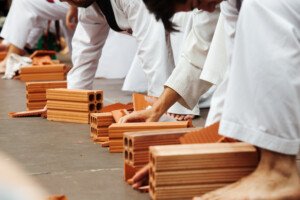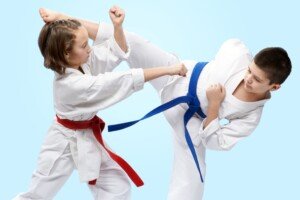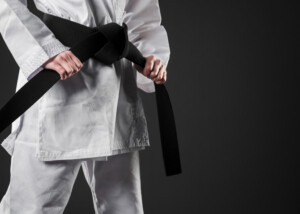Jess began karate at age 5; by 12 she had her black belt.
She’s also autistic and explains how much karate benefited her. Autistic girls and boys should be enrolled in martial arts classes.
Is your young child on the Autism Spectrum?
Whether they’re rail thin, very chubby, extremely introverted and/or clumsy – they will benefit tremendously from martial arts training such as karate.
A high-quality martial arts training studio is a judgment-free zone, where kids will NOT be permitted to make fun of your autistic child for stimming or other behaviors.
Though the title of this article says “girls,” martial arts is invaluable to autistic boys as well.
Unfortunately, even among neurotypical karate students, the boys vastly outnumber the girls.
Girls, especially, need to learn self-defense.
I have a clinical diagnosis of ASD, but years before my diagnosis I had spent several years in the martial arts – never being in any one school long enough to achieve a black belt, but long enough in a variety of schools to know that this is an environment of inclusivity.
ALL ABILITIES ARE WELCOME.
Jess Owen, Diagnosed with Autism at 25
“I started training when I was five, gained my first level black belt when I was 12, and besides the current break I’m taking to look after my 10-month-old, have trained committedly for 22 years,” says Jess, co-creator with her sisters of thewyrdsisters.co.uk.
“I love karate and can’t wait until I have the time to take it up again.”
Martial arts instills self-confidence, something that’s often lacking in big doses in autistic children who are acutely aware that they are “different.”
Jess’s parents thought that karate training would be good for their shy daughter, to help bring her out of her shell. They had no idea, though, that she was autistic.
“As soon as I got my black belt, I was expected to teach,” says Jess.
“Little 12-year-old me would stand in front of a group of five, 10, 15 adults, and bark out instructions that they had to follow.
“I loved it. It was attention, but it was good attention — I knew what I was doing, I was in charge and they had to listen to me despite my age. My social graces weren’t important. I was good at this.”
No, this is not ego. It’s confidence. Imagine that this same child is hanging out with some friends from regular school, and one of those friends offers her a cigarette.
The group is watching her to see if she’s “cool enough” to take a puff.
Many adolescents would be too weak to resist this peer pressure. But suppose that child is used to “barking” orders at adults.
Hmmm – it’ll be a permafrost in hell before she submits to peer pressure to do something she doesn’t believe in!
Martial Arts Offer Autistic Kids Sameness, Routine, a Place to Fit In

Freepik.com/master1305
“I think karate was primarily a place to belong,” says Jess.
“Throughout the years, my classmates changed, my schools, I even moved house once or twice.
“But for over 20 years, I would go to the same building, on the same day and practice the same moves with (mostly) the same people.
“It was a way to be a little bit social — discussing kicks with my bag-work partner or leading a class — without draining me completely.
“It was a field I came to dominate, a totally shared interest with those around me, something I was undisputedly good at. And that meant a lot, no matter what my age.”
Autism Can Be an Asset in Martial Arts
Before you assume that your child is “too autistic” to get anything out of karate, hear this:
“I think as with any hobby or interest, autism benefited me by allowing me to focus singularly and intensely on karate when required,” says Jess.
“It’s a long road from beginner to black belt, but that was always fine with me; lengthy undertakings with little to no short-term gratification is where I shine (though I know that’s not the case with every autistic person).
“In a strange way, my special interests in history and film helped me too.
“Imagining that I was fighting for my life against Viking raiders or at the Battle of Helm’s Deep was a mechanism I could rarely turn off even if I wanted, and gave me that extra spur of motivation when I felt too tired, or even sometimes too bored, to engage.”
Since autism is a Spectrum condition, there are certainly autistic children who would not be able to follow instructions in the setting of a martial arts school.
However, even if your autistic daughter or son is nonspeaking or dramatically stims in public, these traits would not necessarily preclude them from learning a martial art.
Many martial arts classes include disabled children, including those with Down syndrome, hearing impairment, visual impairment and motor difficulties.
Martial arts training is based on the individual’s progress; there are no comparisons to other kids.
But can autism hinder learning karate skills?

Freepik.com/bearfotos
Jess explains, “When I was a child — and even sometimes as an adult — I struggled to tell my left from my right.
“I believe this can sometimes be considered an autistic trait, and impeded me massively until the moves I was learning became instinctual.
“As with many autistic kids and teenagers, I was often told off for ‘daydreaming’ when I was supposed to be listening; though I had a helpful knack of catching up quickly when my brain decided to ‘check back in.’
“The biggest issue I had was being expected to lead warm-ups, as unlike with other aspects of karate, my class had no set routine for that; you just had to make it up.
“In the end, this was the only thing (after my diagnosis) that I ended up pleading my autism to get out of.”
It’s important that a parent disclose their child’s autism diagnosis with the head karate instructor if they believe it will cause some glitches in the training.
Autistic Kids More Likely to Get Bullied in School

Freepik.com
One need not hit a bully or even threaten to hit one to make one back down. Bullies are sheep in wolf’s clothing!
Bullies prey on the kids who send off skittish vibes, who project insecurity.
“Karate made me feel more confident in school and around my peers,” says Jess.
“Knowing that if a bully took things too far I could quite easily break their arm was a comfort, of course, though I also knew just how much trouble I would get in.
“One of the things that was drummed into us was when NOT to use karate.
“If we were being made fun of in school, we were to tell a teacher. If someone tried to grab us in the street, we were to jab them in the eyes and run away.
“If someone in school did hit us — or looked like they were going to — we should warn them we did karate before we so much as laid a finger on them.
“These clear-cut guidelines can be invaluable to an autistic child who can easily fly off the handle if they feel threatened, especially one like me who lived in their own little fantasy world.
“But what karate did for my image and sense of self was invaluable.
“In school I was the quiet, nerdy, bookish kid who doodled in her planner 24/7 and only spoke when spoken to.
“I liked (and was very good at) writing, drawing, singing, sewing and playing piano; so pulling the ‘I have a black belt’ card always took people by surprise.
“It was a wonderfully surprising string to my bow.”
Bullies will pick up on vibes of confidence and self-assuredness. They will stay clear of such individuals.
Martial Arts Can Save an Autistic Person’s Life

©Lorra Garrick
Imagine just how proficient in martial arts an autistic woman would be had she been steadily training since a very young age!
This isn’t about collecting a room full of trophies at tournaments. Sure, if your autistic child wants to go that route, encourage them.
But tournament competition is not necessary to become highly skilled in self-defense and develop anti-bully vibes.
“We all know that social environments like nightclubs and house parties are not always safe, especially for women and girls, ESPECIALLY if they are autistic,” says Jess.
“Autism can dull your perception of danger and make it difficult for you to gauge a person’s intentions.
“I have always struggled to work out whether someone means me harm and have narrowly avoided wandering off with some sketchy characters on a night out.
“But I know one thing: If anyone had so much as touched me without my consent, they would be tasting my Doc Martens [a footwear brand].
“Even having that kind of confidence, even being able to threaten someone and mean it, made the world of difference to me throughout college and university.”
Let’s Normalize Karate for Young Autistic Girls (and Boys)
If you had to choose between ballet and karate for your autistic little girl, it should be clear by now which would be by far the superior choice.
“If you think karate would benefit a neurotypical kid, boy or girl, then it’s going to benefit an autistic kid too,” says Jess.
“Obviously there are things to consider. Is your child non-vocal, does your child have learning support needs, can your child safely engage with other children in this kind of environment?
“But with a few adjustments and a good, dedicated instructor, martial arts can work wonders.
“I turned up to my first class as a painfully shy little girl who wouldn’t leave her parents’ side, and within a few years, I was travelling miles to participate in courses with strangers of all ages.
“I trained with my siblings and father, which helped me massively on days I was feeling less social; so if you can, consider signing your child up with a sibling or friend.”
And by the way, your autistic child is FAR more likely to get injured on a playground or riding her bicycle than in a martial arts class.


 Jess Owen, along with her sisters Emily and Abi, run
Jess Owen, along with her sisters Emily and Abi, run 
























